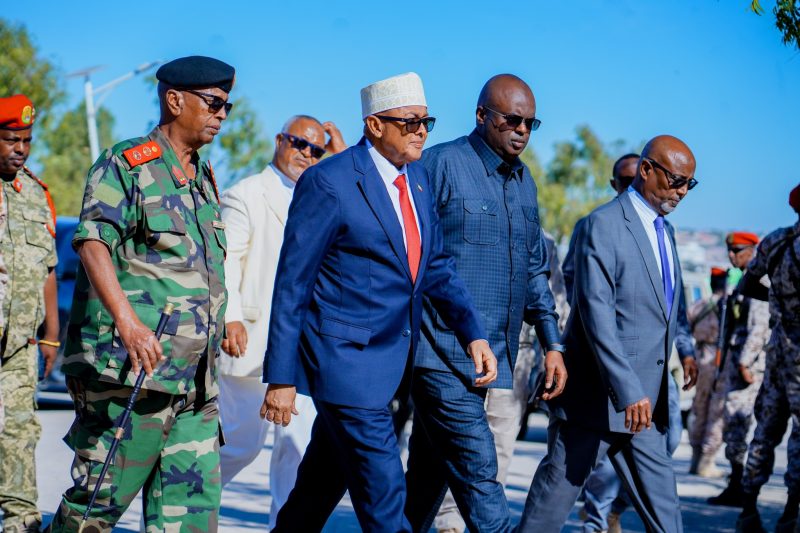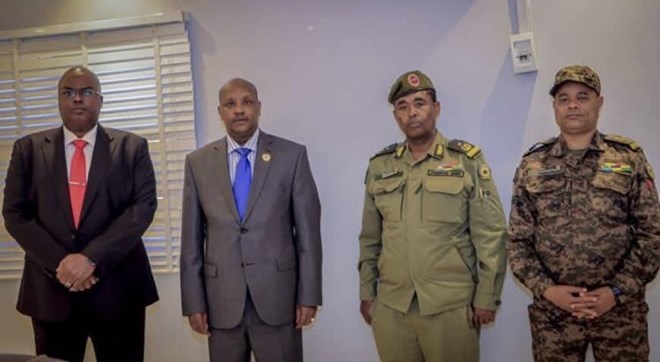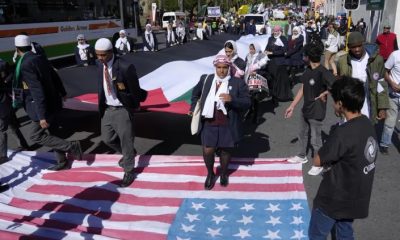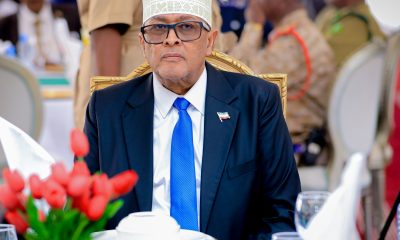Somaliland
Mayor Mooge Under Fire: Leadership, Divisions, and Broken Promises

Hargeisa Mayor Abdikarim Mooge faces mounting criticism over his leadership, divisive politics, and failure to deliver campaign promises. Can he regain public trust?
Mayor Abdikarim Ahmed Mooge of Hargeisa finds himself at the center of political and public scrutiny following a rare and intense four-hour press session aimed at addressing growing frustrations with his leadership. Once hailed as a beacon of transparency and accountability, Mooge is now accused of betraying his promise of impartial governance, alienating key segments of his constituency, and failing to deliver on transformative campaign pledges.
Mooge’s decision to align with the Waddani party has exacerbated divisions within Hargeisa. Once celebrated for his neutrality and commitment to unifying the city’s diverse communities, his partisan stance has provoked accusations of bias and exclusion. His acknowledgment of this rift during the press session, accompanied by a statement of regret—“If God had shown me that following my party would divide my nation, I would have spared my nation”—was seen by many as too little, too late.
This misstep has intensified skepticism about Mooge’s priorities, with critics arguing that his political ambitions have come at the expense of the city’s cohesion. For many residents, his shift to partisan politics feels like a betrayal of the trust that carried him into office.
Adding to the controversy is the gap between Mooge’s ambitious campaign promises and his perceived inability to deliver. Infrastructure, governance, and public service reforms were touted as cornerstones of his agenda, but tangible results remain elusive. Frustrated citizens accuse him of overpromising and underdelivering—a charge Mooge countered during the session by pleading for patience and emphasizing the incremental nature of progress.
However, public discontent goes beyond unmet expectations. Mooge’s campaign rhetoric, which included inflammatory remarks about groups in Borama and Hargeisa, continues to haunt his administration. His recent apology for these statements, though significant, raises questions about the lasting damage inflicted on Hargeisa’s social fabric. Critics argue that his words, now retracted, have already sown divisions that will take far more than apologies to repair.
Mooge’s strained relationship with the media further complicates his challenges. Despite campaigning on a platform of transparency, his reluctance to engage with journalists and allegations of security forces mistreating reporters undermine his credibility. These contradictions threaten the very image of accountability he once championed, leaving the media and public questioning his commitment to openness.
The mayor’s press session ultimately served as a dual-purpose event: a defense of his record and an exercise in damage control. His call for unity and patience reflects an awareness of the precarious position he now occupies, but his words may not be enough to bridge the growing divide between his administration and Hargeisa’s residents.
Mooge’s leadership tenure thus far exemplifies the complexities of navigating governance in a fractured political landscape. His ability to reconcile divisions, rebuild trust, and deliver on promises will determine whether he can salvage his reputation and leave a lasting legacy of progress. For now, Hargeisa’s citizens remain skeptical but hopeful, waiting to see if their mayor can rise above partisanship and rhetoric to deliver the unity and progress they so desperately need.
The road ahead for Abdikarim Mooge is undeniably steep, and time is running out to turn words into action.
Somaliland
Somaliland Seeks Strategic Alliances with the US and Ethiopia

President Irro’s push for stronger ties highlights Somaliland’s aspirations for recognition and regional influence.
Somaliland is ramping up diplomatic efforts to deepen its relationships with Ethiopia and the United States, signaling its strategic ambitions for regional and international engagement. President Abdirahman Mohamed Abdullahi “Irro” has emphasized the critical role of these partnerships in advancing Somaliland’s economic development, security, and global standing.
Ethiopia remains a cornerstone of Somaliland’s regional strategy. As a landlocked nation, Ethiopia depends on Somaliland’s Port of Berbera for access to global markets, and the development of the Berbera Corridor has further cemented this economic interdependence. President Irro highlighted Ethiopia’s pivotal role, stressing the need to elevate cooperation to new heights for mutual benefit. The relationship has flourished since Ethiopia acquired a 19% stake in the Berbera Port, alongside DP World’s majority share, underscoring the economic stakes of this partnership.
Simultaneously, Somaliland is courting closer ties with the United States, which has shown growing interest in the region due to its strategic location along the Gulf of Aden and its stability in the volatile Horn of Africa. US lawmakers have recently advocated for the establishment of a diplomatic office in Hargeisa, a move that could bolster cooperation on security, trade, and development. Somaliland’s stable governance and willingness to engage with international partners position it as a key ally for Washington, particularly in countering threats like terrorism and maritime piracy.
These diplomatic moves are also part of Somaliland’s broader quest for international recognition, a goal it has pursued since declaring back its independence in 1991. While it has maintained a peaceful and democratic environment, it remains unrecognized by any sovereign state. President Irro’s administration has made cultivating relationships with influential partners a cornerstone of its strategy to gain legitimacy on the world stage.
As Somaliland strengthens its alliances, it is clear that the region is seeking not just economic and security benefits but also a path toward greater recognition and influence in global affairs. Whether these efforts will yield the desired outcome remains uncertain, but the momentum suggests that Somaliland’s determination is stronger than ever.
Somaliland
U.S. Push to Open Somaliland Diplomatic Office Aims to Counter China’s Expanding Influence

A strategic move in the Horn of Africa to safeguard U.S. interests
The U.S. House of Representatives Subcommittee on Countering the Chinese Communist Party has taken a significant step toward advancing American interests in the Horn of Africa by proposing the establishment of a diplomatic office in Somaliland. This move, designed to counter China’s growing regional presence, reflects the increasing strategic importance of the Horn as a battleground for global influence.
Somaliland’s location along the Red Sea and the Gulf of Aden offers the U.S. an opportunity to secure vital maritime routes and prevent Beijing from gaining a strategic foothold. Despite Somaliland’s lack of international recognition as an independent state, its political stability and willingness to align with Western partners make it an appealing ally in an area fraught with geopolitical rivalries.
U.S. lawmakers argue that Somaliland’s independence from Somalia—practically, if not formally recognized—has kept it largely free from Chinese influence. However, this advantage is tenuous, as Beijing continues to expand its reach across Africa through infrastructure projects, loans, and military partnerships. By engaging directly with Somaliland, Washington could establish a buffer against China’s advance while strengthening its own strategic presence in the region.
Advocacy for closer U.S.-Somaliland ties has been growing in recent years. Former Somaliland President Muse Bihi Abdi’s visit to Washington in 2022 underscored the region’s desire for deeper bilateral relations, with Bihi emphasizing the importance of Somaliland’s stability and its role in safeguarding maritime routes. The visit also highlighted concerns about China’s expanding presence in the Red Sea, which could threaten U.S. and allied interests.
While the proposal for a diplomatic office stops short of formal recognition of Somaliland as an independent state, it marks a significant shift in U.S. policy. By engaging Somaliland directly, the U.S. sends a clear signal of its intent to counter Chinese expansionism in Africa. This initiative is also aligned with recent legislative efforts, including bills introduced to strengthen U.S.-Somaliland relations, reflecting a growing bipartisan consensus on the issue.
However, the proposal is not without its challenges. Establishing a U.S. presence in Somaliland risks escalating tensions with Somalia, which views Somaliland as a breakaway region. Additionally, China is likely to respond by intensifying its own efforts in the Horn of Africa, potentially creating a new arena of rivalry between the two global powers.
The strategic calculus for the U.S. remains clear: Somaliland represents a unique opportunity to bolster American influence in a critical geopolitical corridor. Failure to act quickly could see China capitalizing on the region’s vulnerabilities, undermining U.S. interests and further entrenching Beijing’s dominance across Africa. For Washington, opening a diplomatic office in Somaliland is more than a symbolic gesture—it is a necessary step to safeguard its position in the Horn of Africa and beyond.
Somaliland
Somaliland’s Military Overhaul – Promise or Necessity?

President Irro pledges advanced weaponry, new military branches, and a 200% salary boost for soldiers as Somaliland faces growing security challenges.
Somaliland’s President Abdirahman Mohamed Abdullahi Irro has unveiled an ambitious plan to modernize the military and significantly increase soldiers’ salaries. The move comes at a critical time, as Somaliland faces mounting security challenges and a loss of control in parts of the Sool region following recent clashes with SSC-Khatumo forces.
A New Vision for Somaliland’s Military

In a high-profile meeting with senior military officials in Hargeisa, President Irro vowed to create a national army equipped with cutting-edge weaponry and comprehensive training. He outlined plans to:
- Introduce advanced weaponry to secure Somaliland’s borders, airspace, and seas.
- Draft new military laws to streamline the armed forces.
- Establish an air force and reserve units to strengthen national defense.
- Integrate civilian militias formed during recent conflicts in eastern Somaliland.
President Irro emphasized that these reforms are not merely campaign rhetoric but are already in motion, citing the implementation of a 200% salary increase for soldiers as evidence of his commitment.
Strategic Timing Amid Mounting Challenges

The president’s announcement comes at a time of heightened tension and significant military setbacks for Somaliland. Recent defeats in the Sool region, particularly in Las Anod, saw hundreds of Somaliland soldiers captured and critical military equipment seized by SSC-Khatumo forces. These losses have raised questions about the current state of Somaliland’s military readiness and morale.
By modernizing the military and boosting salaries, President Irro aims to address both operational deficiencies and declining morale among troops. A well-equipped and motivated army is essential not only for countering the SSC-Khatumo threat but also for maintaining Somaliland’s broader security and territorial claims.
Financial and Political Feasibility
While the vision of a modern military is commendable, questions remain about its feasibility. Somaliland operates without international recognition, limiting its access to foreign military aid and advanced weaponry. The ambitious plans to raise salaries, procure modern equipment, and establish new branches such as an air force will require significant financial resources.
President Irro’s government will need to balance these military expenditures against other pressing domestic needs, including infrastructure, education, and healthcare. Critics may also question whether such sweeping reforms can be achieved without external support or partnerships.
Implications for the Region

A modernized Somaliland military could shift the balance of power in the contested regions of Sool, Sanag, and Togdheer, where territorial disputes and clan-based conflicts persist. The integration of civilian militias into the national military structure, if successful, could enhance local cooperation and strengthen Somaliland’s control over these volatile areas.
However, the announcement could also escalate tensions with SSC-Khatumo forces and other groups that oppose Somaliland’s territorial. The modernization push might be perceived as a threat, prompting further mobilization and resistance in contested regions.
Challenges of Military Modernization
Somaliland faces several obstacles in achieving its military modernization goals:
Resource Constraints: Without international recognition, Somaliland’s ability to acquire advanced weaponry and training is limited.
Regional Dynamics: Modernizing the military could alarm neighboring Somalia and other actors, potentially leading to increased regional instability.
Internal Divisions: The integration of civilian militias and the focus on eastern regions may deepen clan-based divisions, complicating national unity efforts.
A Bold Vision Amid Uncertainty

President Irro’s pledge to modernize Somaliland’s military and enhance soldier welfare represents a bold step toward strengthening the nation’s security apparatus. However, the success of these reforms will depend on overcoming significant financial, political, and logistical challenges.
In a region marked by deep divisions and ongoing conflicts, a stronger military could bolster Somaliland’s claims to stability and self-governance. Yet, if not carefully managed, this ambitious agenda risks exacerbating tensions both internally and with external actors.
As Somaliland moves forward with its military overhaul, the stakes are high for both the government and the broader region. Whether these promises will translate into tangible progress or remain political aspirations remains to be seen.
Somaliland
Tensions Boil Over in Somaliland’s Sanag Region: Erigavo at the Brink of Full-Scale Conflict

As Somaliland and SSC-Khatumo forces mobilize in Erigavo, fears of an all-out confrontation loom over the volatile Sanag region.
The Sanag region, particularly the city of Erigavo, has become a flashpoint in the escalating conflict between Somaliland forces and SSC-Khatumo fighters. Tensions, simmering for months, have sharply intensified, with both sides mobilizing for potential large-scale clashes. This conflict represents yet another chapter in the broader instability plaguing Somaliland’s contested regions.
Escalation in Erigavo
In recent hours, reports and social media imagery depict armed forces on high alert. Somaliland troops, bolstered by allied militias, have reportedly advanced into Erigavo, signaling their intent to consolidate control over the city. Meanwhile, SSC-Khatumo forces stationed outside the city are organizing and preparing for confrontation.
The heightened militarization follows months of unresolved tensions rooted in deep-seated clan rivalries and territorial disputes. Erigavo, already strained by previous skirmishes, now faces the prospect of becoming a central battleground.
This escalation mirrors earlier confrontations in Las Anod and other Sool region towns, where SSC-Khatumo fighters successfully pushed Somaliland forces out, taking control of key areas. Their strategy now appears to focus on extending this momentum into Erigavo, aiming to establish full authority over the Sanag region.
The ongoing conflict is more than just a local power struggle; it reflects the fragility of Somaliland’s territorial claims and governance structure. Somaliland, which has long sought international recognition as an independent state, faces increasing challenges in maintaining authority over disputed regions. The SSC-Khatumo administration, representing factions opposed to Somaliland’s rule, has leveraged local grievances and clan dynamics to gain ground in these contested areas.
Losing control of Erigavo, a strategically important city in the Sanag region, would deal another severe blow to Somaliland’s authority. Such a loss could embolden other anti-Somaliland factions, further destabilizing the region.
Humanitarian Impact
The conflict’s human toll is already evident. Previous clashes in Erigavo and the surrounding Sanag region have displaced thousands, with many residents fleeing to escape violence. Humanitarian conditions are worsening as resources in the area become increasingly scarce.
The intensified fighting risks creating a new wave of displacement, further straining aid efforts in a region already grappling with limited infrastructure and services. The lack of peace negotiations only exacerbates the dire situation for civilians caught in the crossfire.
The Aftermath of Las Anod
The current focus on Erigavo follows the fallout from clashes in Las Anod, where Somaliland forces suffered significant losses. The inability to maintain control over Las Anod and other towns has fueled frustrations within Somaliland’s leadership, possibly prompting a more aggressive military posture in Erigavo.
The SSC-Khatumo administration, emboldened by their successes in Las Anod, is likely to view Erigavo as another critical step in asserting their autonomy over Somaliland-claimed regions. However, any large-scale conflict in Erigavo could trigger a broader regional escalation, drawing in clan militias and further destabilizing the already volatile landscape.
Prospects for Peace
Efforts to mediate the Erigavo conflict remain absent, with no credible peace process currently underway. The lack of dialogue underscores the entrenched divisions between Somaliland and SSC-Khatumo leaders. Without meaningful negotiations, the risk of prolonged violence in Erigavo and beyond remains high.
Conclusion: A Fragile Region on the Brink
The escalating tensions in Erigavo highlight the deepening fault lines within Somaliland’s regions. For Somaliland, maintaining control over Erigavo is critical to preserving its territorial integrity. For SSC-Khatumo forces, capturing the city represents a symbolic and strategic victory in their broader struggle against Somaliland’s authority.
As the two sides prepare for confrontation, the stakes are high—not only for the combatants but for the thousands of civilians whose lives hang in the balance. Without immediate intervention or dialogue, the Sanag region faces the grim prospect of becoming the latest epicenter in Somaliland’s growing instability.
Somaliland
Somaliland President Enforces Revenue Transparency and Accountability

President Abdirahman Irro mandates all government revenue be centralized under the Ministry of Finance to curb mismanagement and boost public trust.
Somaliland President Abdirahman Mohamed Abdullahi Irro has ordered all ministries and agencies to transfer collected revenues to the Ministry of Finance. This policy marks a significant step toward addressing long-standing issues of fiscal mismanagement and ensuring that Somaliland’s limited resources are effectively utilized.
During a cabinet meeting in Hargeisa, President Irro underscored the importance of proper revenue management. “It is unacceptable for the person generating the revenue to spend it,” he declared, emphasizing that the Ministry of Finance must oversee all disbursements.
The directive is part of a broader push to eliminate financial opacity and prevent revenue-collecting agencies from engaging in unauthorized expenditures. The president highlighted the Ministry of Aviation as a model for adopting these reforms, urging other ministries to follow its example and adhere strictly to approved budgets.
A significant aspect of the new measures is the suspension of unauthorized tax exemptions granted to private companies in recent years. President Irro emphasized that these illegal tax breaks had eroded government revenues and undermined trust in public institutions. By putting an end to these practices, the administration aims to restore confidence in its financial governance and ensure fairness in the tax system.
The Ministry of Finance has been tasked with enforcing these changes and conducting a mid-year review to identify areas for further adjustment. This proactive approach is intended to assess the effectiveness of the new measures and adapt to emerging challenges.
In addition to internal reforms, President Irro emphasized the importance of building strong relations with the international community. By fostering partnerships and securing external financial assistance, Somaliland aims to support its developmental goals and navigate the economic challenges it faces as an unrecognized state.
The focus on transparency and fiscal discipline is likely to resonate positively with international donors and investors, who often cite good governance as a key criterion for financial support.
While these reforms signal a commitment to accountability, their success will depend on consistent enforcement and a cultural shift within government agencies. Resistance from entrenched interests or agencies accustomed to financial autonomy could pose significant obstacles.
However, if successfully implemented, these measures could strengthen Somaliland’s public institutions, improve budgetary efficiency, and attract greater support from international stakeholders. Moreover, aligning financial activities with approved budgets will enhance the government’s ability to invest in critical sectors such as education, healthcare, and infrastructure.
President Irro’s directive to centralize revenue management represents a pivotal moment in Somaliland’s pursuit of financial transparency and good governance. By cracking down on illegal tax breaks and streamlining fiscal operations, the administration is laying the groundwork for sustainable economic growth and international credibility.
If these reforms are executed effectively, they could not only improve Somaliland’s fiscal health but also solidify its reputation as a self-reliant and well-governed entity in a region often marred by corruption and inefficiency.
Somaliland
Somaliland Advocate Tibor Nagy Resumes Role at US State Department

Prominent Somaliland advocate and ex-diplomat Tibor Nagy returns to the State Department in a broader temporary role, pausing public commentary on African affairs.
Former US Assistant Secretary of State for Africa, Tibor Nagy, has announced his temporary return to the US State Department, broadening his focus beyond African affairs. Known for his strong advocacy for Somaliland’s recognition as an independent state, Nagy has paused his public commentary during this tenure, signaling a cautious recalibration of his approach to sensitive geopolitical matters.
Nagy’s return comes at a pivotal time for US policy in the Horn of Africa, where regional stability and global power competition are in sharp focus. Somaliland seeking international recognition, has long found an ally in Nagy. He has previously championed Somaliland’s democratic achievements and strategic potential, advocating for US recognition as a move that aligns with Washington’s interests.
Nagy is joined by another vocal Somaliland supporter, Dr. J. Peter Pham, the former US Special Envoy for the Sahel Region, who is reportedly returning to the State Department’s Africa office. Both diplomats have criticized the “Greater Somalia” policy, which envisions Somalia’s reunification with Somaliland. They argue that Somaliland’s independence presents a strategic advantage for the United States in countering growing Chinese and Russian influence in the region.
While both Nagy and Pham pause their advocacy, the US faces a delicate balancing act. Somalia remains a key ally, critical to US security interests and efforts to counter extremist threats. However, analysts contend that failure to recognize Somaliland’s achievements risks overlooking a stable and democratic partner in a volatile region.
As China and Russia extend their reach in the Horn of Africa, the US must carefully navigate its relationships. Somaliland offers untapped strategic opportunities, including access to the vital Gulf of Aden. Still, the potential costs of alienating Somalia complicate this calculus.
Nagy’s temporary absence from Somaliland advocacy may reflect broader considerations within US foreign policy as Washington weighs its options in a rapidly shifting geopolitical landscape. However, his and Pham’s legacy of support for Somaliland underscores the importance of reevaluating traditional policies to seize emerging opportunities in the region.
Somaliland
Somaliland and Ethiopia Explore Enhanced Military Cooperation Amid Regional Diplomatic Shifts

Defense officials discuss strategies for strengthened security ties, navigating complexities from Somalia’s influence and regional diplomacy.
Somaliland and Ethiopia convened in Hargeisa to deliberate on expanding military and security cooperation. The meeting, attended by Somaliland’s Defense Minister Mohamed Yusuf Ali, Ethiopian Ambassador Teshome Shunde Hamito, and high-ranking military officials, underscored the ongoing partnership between the two sides despite regional complexities.
Ethiopia has played a pivotal role in strengthening Somaliland’s defense capabilities, including training thousands of soldiers and police officers annually. However, this cooperation is shadowed by the annulment of a memorandum of understanding (MoU) last year, which had provisioned Ethiopia access to Somaliland’s coastline in exchange for potential recognition of its independence. The MoU’s cancellation, under pressure from Somalia’s federal government, has left lingering questions about Ethiopia’s long-term commitments to Somaliland.
Somalia and Ethiopia recently restored full diplomatic ties following Turkish mediation, further complicating Ethiopia’s military engagement with Somaliland. Somali President Hassan Sheikh Mohamud and Ethiopian Prime Minister Abiy Ahmed have agreed to enhance bilateral relations, potentially sidelining Somaliland in regional power dynamics.
For Somaliland, Ethiopia remains a crucial partner in maintaining security and building military infrastructure, particularly as the region faces persistent threats from militant groups. Yet, Ethiopia’s renewed alignment with Somalia raises concerns about its ability to balance relationships with both Hargeisa and Mogadishu.
The meeting reflects Somaliland’s strategic efforts to reaffirm its partnerships amidst a shifting regional landscape. However, the broader implications of Ethiopia’s diplomatic recalibration and Somalia’s influence will likely test the resilience of Somaliland-Ethiopia ties. As Somaliland navigates these challenges, its ability to maintain robust security partnerships will be pivotal in safeguarding its autonomy and regional aspirations.
Somaliland
Presidential Decree Signals New Era of Governance in Somaliland

President Abdirahman Mohamed Abdullahi Irro appoints nine new Directors General to lead critical government ministries.
On January 16, 2025, President Abdirahman Mohamed Abdullahi Irro of Somaliland issued a presidential decree appointing nine new Directors General to key government ministries. This significant reshuffle marks a step forward in Irro’s commitment to reshaping the government’s structure and addressing pressing national challenges.
The appointments were made under the authority granted by Article 90 of the Somaliland Constitution. President Irro emphasized the importance of knowledge, skills, and experience in selecting officials to lead critical ministries. He described the appointments as central to ensuring effective governance and serving the people of Somaliland.
Key Appointments and Their Strategic Implications
1. Ministry of the Presidency
- Appointee: Munir Ahmed Igaal Farah
- Significance: The Ministry of the Presidency plays a central role in coordinating government activities and executing the president’s vision. Munir Ahmed Igaal Farah’s appointment underscores the administration’s focus on strong and streamlined leadership.
2. Ministry of Labour, Social & Family Affairs
- Appointee: Abdishakur Ismail Hussein Kahin
- Significance: This ministry is essential for addressing employment challenges, social welfare, and family policy. Kahin’s expertise is expected to enhance the ministry’s capacity to deliver on social development goals.
3. Ministry of Agricultural Development
- Appointee: Abdirisaaq Ahmed Gas Farah
- Significance: Agriculture is the backbone of Somaliland’s economy. Farah’s appointment signals an intensified effort to modernize agricultural practices and ensure food security.
4. Ministry of Religion and Endowments
- Appointee: Abdalla Mohamed Yusuf Abdi
- Significance: This ministry fosters spiritual well-being and oversees religious affairs. Abdalla’s leadership is anticipated to strengthen community engagement and support religious harmony.
5. Ministry of Health Development
- Appointee: Dr. Ahmed Mohamud Jama (Zaki)
- Significance: As Somaliland continues to grapple with public health challenges, Dr. Zaki’s appointment highlights a renewed focus on healthcare reforms and service delivery.
6. Ministry of Education, Training, and Science
- Appointee: Abdirahman Hussein Haji Hirsi
- Significance: Education is crucial for Somaliland’s long-term development. Haji Hirsi is tasked with advancing educational standards and promoting access to quality learning.
7. Ministry of Animal Husbandry and Rural Development
- Appointee: Ahmed Osman Jama Farah
- Significance: This ministry supports livestock, a key pillar of Somaliland’s economy. Farah’s leadership is expected to improve rural livelihoods and boost livestock production.
8. Public Service Organization
- Appointee: Said Muse Xoosh Coofle (Rooble)
- Significance: Ensuring efficient public service delivery is critical for governance. Coofle’s expertise will be instrumental in reforming public administration and improving service quality.
9. Higher Education Commission
- Appointee: Aden Jama Duale Barre
- Significance: The commission oversees higher education standards and innovation. Barre’s role will be vital in fostering academic excellence and research development.
Strategic Vision for Governance
President Irro’s appointments reflect a strategic alignment with his administration’s goals of efficiency, development, and public service. By selecting individuals with specialized knowledge and experience, the president has signaled his intent to focus on competency-driven governance.
This reshuffle also demonstrates Irro’s commitment to tackling pressing issues such as healthcare reform, educational advancement, agricultural modernization, and public service efficiency. With Somaliland facing internal and external challenges, these appointments come at a critical time.
Challenges Ahead
Despite these promising appointments, the administration will face significant hurdles. Somaliland’s quest for international recognition, domestic economic development, and maintaining political stability remain top priorities. The new Directors General must navigate complex regional dynamics while delivering tangible benefits to the people of Somaliland.
The success of these appointments will depend on the appointees’ ability to implement effective policies and work collaboratively across government sectors. Public trust in the government’s ability to deliver will be a key measure of success.
Conclusion
President Irro’s decree marks an important milestone in shaping his administration’s vision for Somaliland’s future. By appointing experienced and capable leaders, the government has taken a step toward addressing the nation’s challenges. However, the road ahead will require careful coordination, transparency, and a steadfast commitment to national development. The coming months will reveal whether these new leaders can rise to the occasion and fulfill their mandate.
-

 Africa10 months ago
Africa10 months agoHow Somaliland Could Lead the Global Camel Milk Industry
-

 Top stories10 months ago
Top stories10 months agoIsrael Announces Plans to Reopen Border Crossings: The Latest Developments
-

 Editor's Pick11 months ago
Editor's Pick11 months agoHow the Greatest Hacker Manipulated Everyon
-

 Analysis9 months ago
Analysis9 months agoBiden Stands Firm with Israel Amid Iran’s Aggression: A Test of Resilience
-

 Top stories7 months ago
Top stories7 months agoTragedy Strikes Malawi: Vice President Saulos Chilima Among Victims in Fatal Plane Crash
-

 Analysis9 months ago
Analysis9 months agoIran escalates conflict, attacking Israel; US forces help Israel to intercept Iranian projectiles
-

 Analysis9 months ago
Analysis9 months agoIsrael and Iran on Edge: Tensions Escalate Amidst Rising Threats
-

 Analysis8 months ago
Analysis8 months agoA New Dawn for Somaliland: Global Recognition Expected by June 2024






























